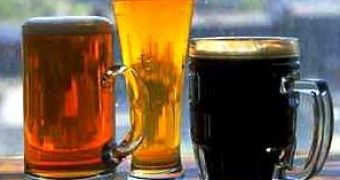A study conducted in the UK suggests that as much as 25 percent of the population of the country is protected against alcohol-related cancers as a result of having certain genetic mutations that allows the body to eliminate the alcohol much faster than in the case of the rest of the population. This in turn alters the carcinogenic effects of alcohol, reducing people's chances of developing mouth, throat or oesophageal cancers to half.
The newly found genes mutate from the ADH7 and ADH1B genes, which are responsible for processing the alcohol in the body. According to estimations, up to 25 percent of the UK population bears at least one copy of the two genes, if not both. The study, which involved some 9,000 people, revealed that having at least one of the two can reduce the risk of alcohol-related cancer to less than half.
People having one copy of ADH1B run a 50 percent risk of developing cancer as a result of alcohol consumption, while those with ADH7 run a risk of only 32 percent. This is the first time a study identifies genes that offer humans some protection against the effects of alcohol consumption.
"We don't know how the protection occurs, but we do now know that these genes have that effect, and that could be hugely useful in giving us a much broader understanding of cancer processes in general," said Professor Martin Wiseman, medical and scientific adviser to the World Cancer Research Fund, who did not participate in the study.
Estimations indicate that about 5 percent of cancer cases in the UK are related to alcohol, which has been linked to mouth, breast, bowel, liver, pharynx, larynx and oesophagus cancers. Although the study seems to bring some good news amongst heavy drinkers, it does not encourage the consumption of large quantities of alcohol.
"This shouldn't have any direct effect on people's drinking behavior. Those people with one or both of these rare gene variants are lucky in that they are at lesser risk of developing these cancers. Having up to half the risk is significant. But they still face some risk. So the advice to them wouldn't be, 'Go away and drink'. It would be, 'For cancer prevention, avoid alcohol entirely if you can and, if you do drink, limit it to one drink a day for a woman and two drinks a day for a man'," said Wiseman.
Additionally, people having these genes would have little chance of finding out, since medical investigations cannot point out towards the genetic make-up, not to mention that even some of the most advanced methods used today are still incredibly difficult to carry out and could also be unreliable.
"Every human being has the seven [ADH] genes that, when you drink a beer or whisky, start to break down the ethanol in the alcohol which many believe is the cancer-causing agent. But those 20 to 25 per cent of people who have one or both are gene variants - if they drink alcohol, their risk of getting these head and neck cancers is reduced by about half," said Dr Paul Brennan of the International Agency for Research on Cancer, France.
The results of the study conducted by Brennan indicate that about 20.5 percent of the population of Manchester possesses the ADH7 gene, followed by Edinburgh with 16 percent and Newcastle, 15 percent. 6 percent of the population of Edinburgh and 4 percent of those living in the other two cities appear to have the ADH1B gene.
Further study of the two genes is likely to lead to the development of drugs that could reduce the effects of heavy alcohol consumption. The bad news is that the study indicates that people consuming moderate amounts of alcohol are more likely to get alcohol-related cancer than heavy drinkers bearing the newly found genes.
"This adds to existing evidence that alcohol increases the risk of these types of cancer. It also highlights that both our genes and our lifestyle influence cancer risk and will help scientists understand more about the disease. It's important to stress that these results don't mean that people can drink too much and hope they won't be at risk. These genetic variants are rare and still don't protect people totally from the damage caused by alcohol," said Dr Julie Sharp, science information manager at Cancer Research UK.

 14 DAY TRIAL //
14 DAY TRIAL //